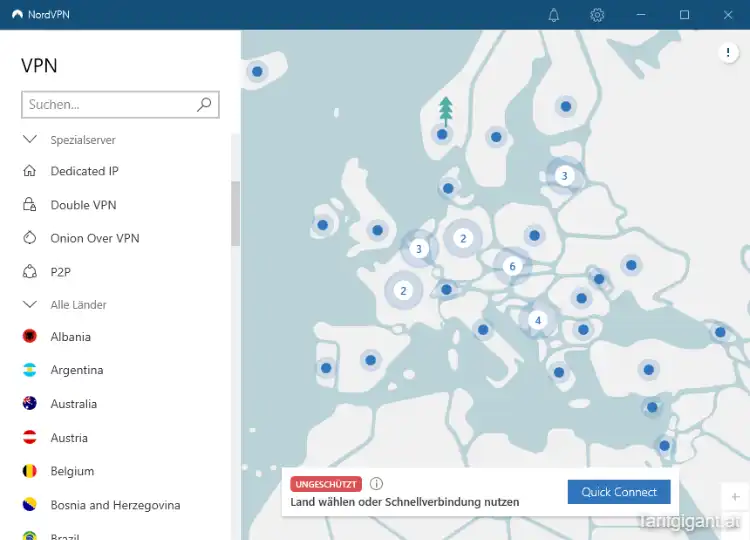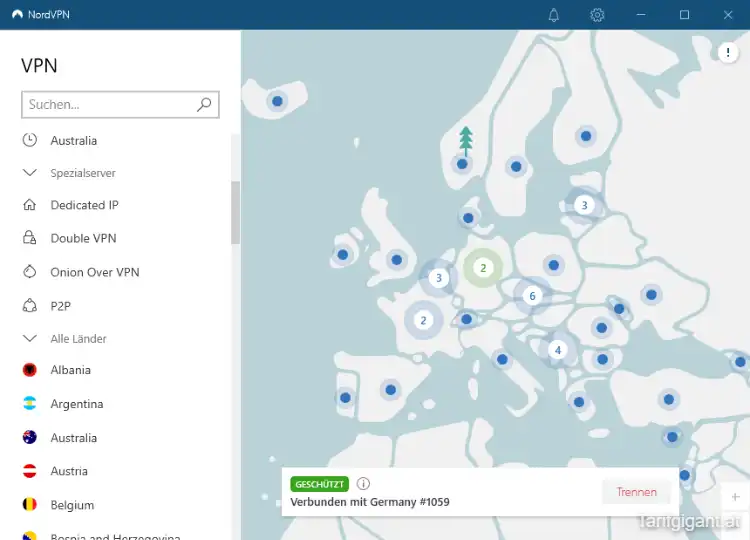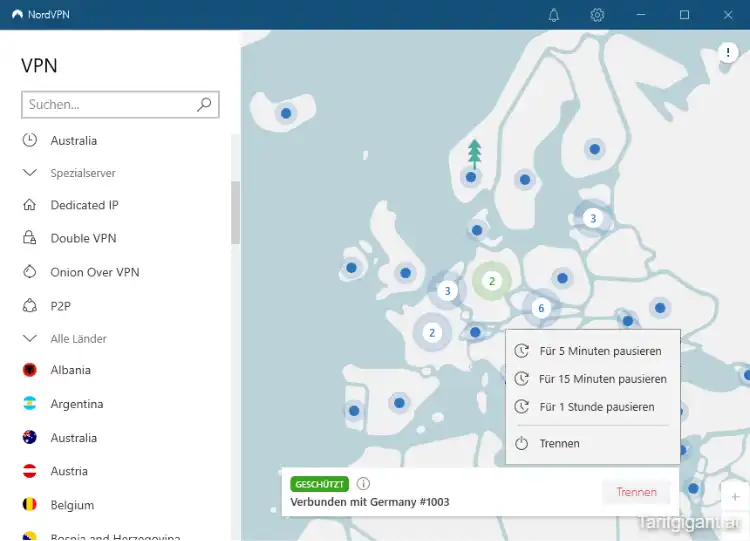What is a VPN tunnel?

Snoopers and hackers can often tap sensitive data from the Internet without much effort and thereby jeopardize your safety. Your data is valuable and you should protect it from prying eyes. A VPN tunnel similarly to a real tunnel, lays a Protective jacket about your Data traffic and thus fends off curious glances. In this article you will learn not only what a VPN tunnel actually is, but also Which protocols can be used for such a tunnel and in which the Advantages and disadvantages of a VPN tunnel lie
>> Go to VPN Austria comparison >>
Content
What is a VPN tunnel?
A VPN tunnel is an encrypted connection between your device and a VPN server. When your device connects to the VPN, the process is similar to plugging a network cable into the router on another network, often in another country. In the process, your connection looks like it's coming from the newly assigned network. This will give you a changed IP address which causes a different routing.
Figuratively speaking, a VPN functions similarly to a tunnel. For an outside observer, it is visible which cars drive out of the tunnel and which drive in. However, the observer cannot see on which way the cars drive from the entrance of the tunnel to the exit.

A VPN makes your traffic unreadable through encryption
The connection to the VPN server is encrypted and cannot be cracked without the cryptographic key. Therefore, neither snoopers or hackers nor your ISP can see what you do on the Internet. This cloak protects you from attacks and hides what you do online.
A VPN assigns you a new IP address, which is not traceable.
With a VPN tunnel, your data traffic is first routed to a server of the VPN network, which then establishes a connection with the desired website and forwards the data to you. It is not obvious to the website that the data is being forwarded. It assumes that the VPN server is the user. Due to the combination of newly assigned IP address, the Encryption any traffic and the fact that No logs are created, you are connected via a VPN tunnel. totally anonymous on the net.
A VPN server not only processes data from a single user, but countless users are connected to it via the same IP address. It is like one big data point that connects countless users to countless sites.
That's why the image with the tunnel fits so well here: No one can see from the outside on which path the data flows from the input (your computer) to the output (the Internet).
Due to this Protective jacket snoopers and hackers cannot intercept and misuse the exchanged data.
Many good VPN provider like NordVPN have - as already mentioned - a no log policy. This means that any sensitive data that could reveal your identity is not collected in the first place.
The fact that there are Services like Netflix nevertheless succeed VPN networks does not mean that your identity has been revealed. Instead, Netflix only detects that an unusual amount of traffic is coming from a network node and then suspects a VPN network. With AES 256 encryption, whoever accesses the network remains anonymous for services such as NordVPN but completely hidden.
How does a VPN tunnel work?
In order to use a VPN, you need special software that must be installed on the desired terminal device beforehand.
There are countless VPN provider provide the excellent VPN software ready configured. Often are Free VPN particularly tempting for beginners. However, you should always keep in mind that the operation of a VPN network is associated with high costs. Some free VPNs compensate for these costs by selling your data, which is why you have to pay for them. Free VPN are a double-edged sword.
The use of a VPN is often very simple. Depending on the software, you press the appropriate button and your traffic is protected. In the case of Nord VPN this is the Quick Connect Button. After a short Connection time you are connected to the VPN server:




After successful authentication, the VPN server assigns the client an IP address that can be used for anonymous data exchange. All further communication is then encrypted via the established tunnel, as shown in the image above. This makes it virtually impossible for attackers to intercept the exchanged data or find out the identity of the network subscriber.

Under the hood, VPN providers use different Transmission protocolswhich vary in speed and security. The most important transmission protocols are OpenVPN and Wireguard.
While OpenVPN works with any ISP, this is not the case with the faster Wireguard. Wireguard requires a dual-stack mechanism, which is not yet offered by some cable providers. If this infrastructure is missing, Wireguard cannot be used and you have to switch to OpenVPN or contact your network provider and ask if they can switch dual-stack.
Here we present the most important transmission protocols:
OpenVPN
Speed: high
Security: high
Most VPN providers offer the open source protocol OpenVPN. With 600,000 lines of code, it's not exactly a lightweight, but it's still considered a fast and safer.
Advantages OpenVPN
- Works with any ISP, no matter if you have a Dual-Stack or Dual-Stack Lite (e.g. Vodafone in Germany) mechanism
- Open source protocol that works with Windows, Mac, iOS, Android and Linux. Source code is viewable and editable.
- The OpenVPN protocol can run over the TCP or UDP Internet protocols;
- High security
- Good speed
Disadvantages OpenVPN
- Own facility difficult
- Very extensive code with 600,000 lines
WireGuard
Speed: very high
Security: very high
Wireguard is superior to the OpenVPN protocol in terms of the speed of the VPN tunnel. It is programmed in a much leaner way. In contrast to OpenVPN, which has 600,000 lines of code, Wireguard has just 4,000 lines of code. This makes it blazingly fast. A disadvantage to mention is that it only with true dual stack and not with Dual-Stack Lite, which sends data to an IPv4 address through an IPv6 tunnel.
Advantages Wireguard
- Very slim and therefore blazingly fast
- Best suited for streaming and gaming
- Open source protocol that works with Windows, Mac, iOS, Android and Linux.
- High security.
Disadvantages Wireguard
- Higher infrastructure requirements than OpenVPN (-> dual stack mechanism)
What are the advantages of VPN tunnels?
The use of a VPN is always useful when a user is on an insecure network.
Especially WLAN provided in busy public places makes it easy for attackers to spy on credit card information, emails, chat logs or personal data of other network subscribers.
However, VPNs are also increasingly used by companies, so that you as an employee can also access the company network outside of the office. Depending on the configuration of the VPN, it may even be possible for employees to access company drives and thus location-independent to pursue their work.
VPNs are therefore the ideal solution for those who value secure and anonymous data exchange.
But with VPNs you can also ORF lock or from Servus TV handle, and thus Formula 1 race without Sky look. This is possible from all over the world through the VPN tunnel, but many Germans might be especially interested in a possibility to watch the Watch Formula 1 in Germany for free, after it stopped airing on RTL in 2021.
What are the disadvantages of VPN tunnels?
Encrypted data exchange does not only have advantages. For example, a VPN can have a negative impact on the speed of the network, and the authentication mechanisms applied can also be demanding and time-consuming.
In addition, not every VPN software can be used on every device and especially for companies, the use of a personal VPN is associated with additional costs. This is because the software is not free of charge and must also be maintained. IT costs are incurred both for subscriber administration and for the configuration and maintenance of any tokens or certificates, which in turn must be handled by the company's own employees or purchased externally.
What should you look for in VPN tunnels?
The security of a VPN is guaranteed on the one hand by the transmission protocols and encryption mechanisms used. Here we show you in a nutshell, what you have to consider with a VPN should.
There is no such thing as a perfect VPN, and using a VPN does come with some risks, but these can be greatly minimized by paying attention to the following points:
1. Outdated protocols
Some rogue VPN services use outdated protocols with known vulnerabilities. This includes the Point-to-Point Tunneling Protocol (PPTP), which is no longer used by leading VPN providers.
2. no precaution in case of server failure
If you are using a VPN and its server fails, you are still surfing the Internet, but now without the routing via the VPN. Thus, your IP address is exposed and you are exposed to the same short-term risks as if you were surfing the Internet without a VPN. To avoid this, top VPNs like NordVPN Kill Switch-functions to disable your Internet connection immediately when the VPN is interrupted.
3. free VPN
If a VPN service is free, you should be careful, because you might be the product with your data and not the customer. If you want to test a reputable free VPN, we recommend you to choose a service from our Free VPN list. These services then have certain restrictions in terms of data volume or server selection, which can be lifted by paying a monthly fee.
4.No real no logs policy
Even good VPNs have been caught logging user data and passing it on to the authorities upon request. It is therefore advisable to check the no-logs policy in detail, as I did for example when comparing NorthVPN vs ExpressVPN have done. If the service is based in a country that is not compatible with the 14-Eyest cooperates, it is much easier for the VPN service provider to establish a watertight no-logs policy. like NordVPN to have.
5. poor server configuration and no monitoring of rental servers.
Insecure VPN services do not maintain and configure their servers properly, which allows hackers to gain access to the data. Especially when it comes to rented servers, monitoring the service providers is essential to exclude any compromise of data.
Recommendation
In order to ensure your security and have a secure VPN tunnel, you should switch to an established VPN in a secure legal area with high data protectionz choose. One of the most secure VPN is NordVPNwhich is one of the most stringent No Logs Policies and in the data protection paradise Panama is located. Thus, Nord does not store any logs of metadata such as connection date and time, server and data volume. This is the case with many other VPNs, even if they claim to have a no-logs policy. In addition, NordVPN has numerous special features like duplicate VPN Connection or the Onion VPN. In addition, NordVPN has very high transmission speedsbecause it supports the faster Wireguard protocol in addition to OpenVPN. About this link, you can check which offers are currently available at NordVPN.

What is the added value of a VPN?
A VPN not only enables secure data exchange, but also has a number of other benefits.
For example, the assigned IP address can be from another country. This is always an advantage when you want to visit websites that are only accessible to users from certain countries.
With the help of a VPN, it is thus possible, for example, to Streaming services which are normally blocked for German customers. In addition, you can also use a VPN to play computer games in multiplayer mode that have long been unavailable via the Internet.
If high performance and many features are indispensable for you, I recommend you to compare the NorthVPN vs ExpressVPN once: Here I compare the best VPNs the market has to offer. Cheaper you get with a Free VPN away.
VPN tunnels for Netflix: Why the service can unmask VPNs
VPN services route many users over the same IP address to services like Netflix. On the one hand, this is an advantage, because shared IP addresses More anonymity for the users. On the other hand, it is also a disadvantage: because Netflix can use a script to determine that unusually many accesses from the same IP addresse come. If this happens, the streaming service will block this IP address, because Netflix is not allowed to release the content for users from other countries due to licenses.
The VPNs can counteract this by constantly changing the IP addresses. However, since the Netflix algorithm is getting better at detecting VPNs, it is very costly for VPNs to bypass the Netflix block. Most VPNs therefore do not manage to reliably unblock Netflix. Especially financially strong VPNs like ExpressVPN or NordVPN however, also see this development as an opportunity. In contrast to free VPN Express has the necessary financial resources to circumvent Netflix's geoblocking block.

Reliable VPN for Netflix
If you regularly want to watch Netflix via VPN, you should therefore use a paid VPN. These are the only services that can reliably decrypt Netflix USA.
The ExpressVPN service offers 24/7 Netflix support and has always been able to give me a working server to unlock Netflix. In 2023, Netflix has made it much harder for VPNs to decrypt Netflix due to demands from rights holders. Even top services like Nord or Surfshark have problems decrypting Netflix's US library on the first connection attempt. ExpressVPN is a bit more expensive, but is still the best way to get around the Netflix locks.
Conclusion: What is a VPN?
Using a VPN is worthwhile for self-employed people, business travelers, as well as for ordinary users who care about secure data exchange.
With the help of a VPN, it can be ensured that attackers or government institutions cannot gain access to sensitive company data or to the beloved vacation photos or private chats.
However, when using a VPN, you should always ensure an adequate authentication mechanism and change passwords at regular intervals.
